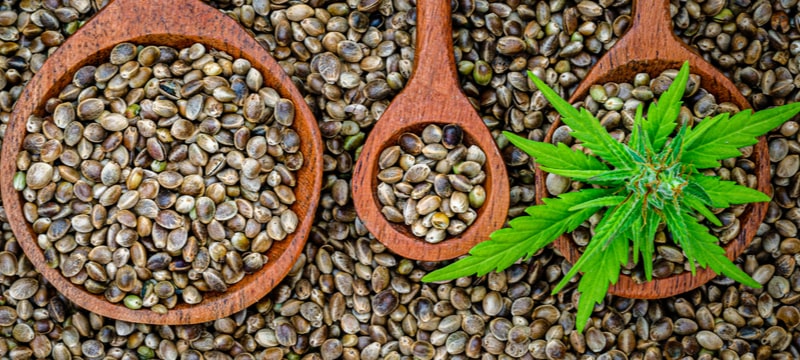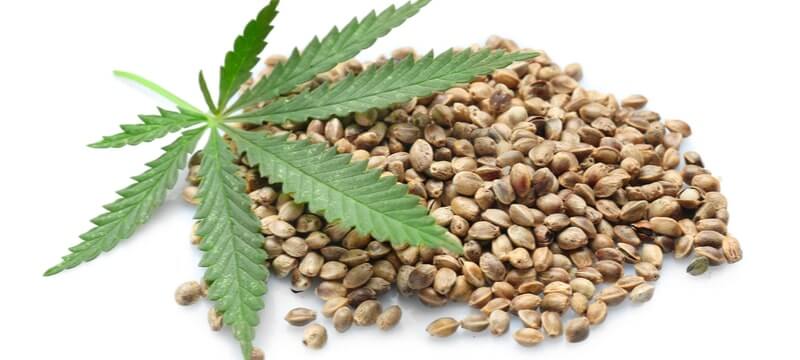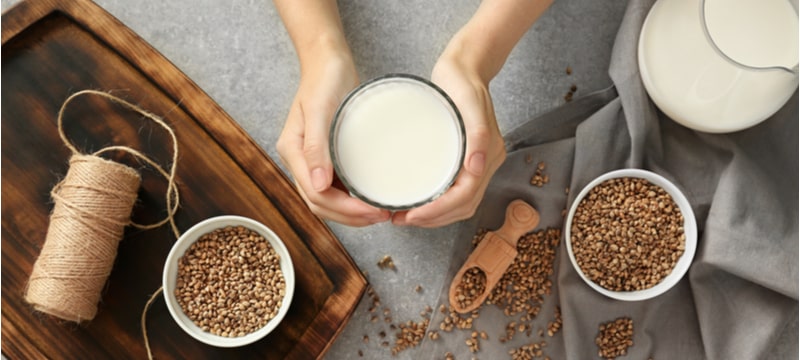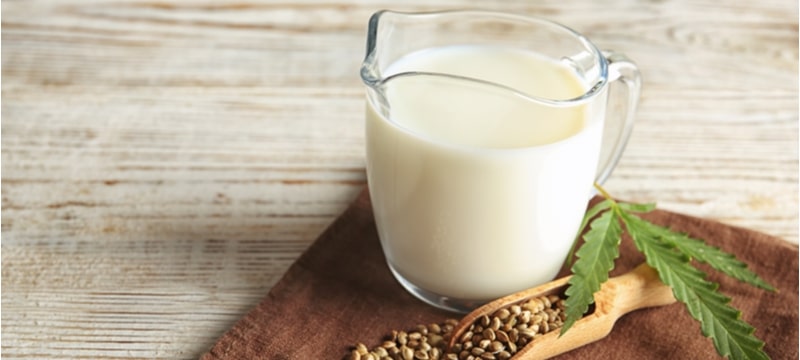
The extreme versatility of hemp has seen its popularity soar in recent years. As ancient and contemporary knowledge combine, the uses for the hemp plant have multiplied, and industries all over the globe are availing of its many potential benefits.
The hemp plant contributes to farming, construction, fashion, the motor industry and health & wellness. However, hemp’s contribution to the health and wellness industry is of particular interest, specifically hemp seeds and hemp hearts, due to their nutritional value.
Table of Contents
Hemp seeds as a source of protein
Hemp seeds have been used in the wellness industry for many years. A derivative of the hemp plant, it is known as a powerhouse of nutrition. Hemp seeds are a fantastic source of plant-based protein; about 25% of calories in hemp seeds come from protein, which is relatively high. In addition, hemp seeds are a complete protein source. So by just having three tablespoons of hemp seeds for breakfast, you're already giving your body between 10 and 20% of your daily protein intake.
Omega -3 benefits of hemp seeds and hemp hearts
Hemp seeds are also an incredible source of polyunsaturated and essential fatty acids, full of omega-three and omega-six fatty acids. Our bodies can not produce these independently, and they make up a three-to-one ratio of healthy fatty acids essential to our autoimmune health.
Studies suggest that the body's immune system depends on the balance of omega -6 and omega-3 fatty acids. Omega-3 fatty acids reduce inflammation, and the other powerful thing about hemp seeds is they are packed with fibre; they have almost no regular carbohydrates or sugar.
Hemp seeds, zinc and magnesium
Hemp seeds and hemp hearts also deliver minerals to our bodies essential in maintaining a healthy brain, immune system and digestive system. These are magnesium, zinc and phosphorus. Magnesium is something our bodies need for relaxing muscles, brain function, and improving digestion. In addition, zinc is essential to our immune function.
Hemp seeds are rich in magnesium, zinc and potassium, so our bodies benefit significantly when consuming hemp seeds and hemp hearts. This is beneficial for people who want to build muscle or strong bones.
Magnesium is also helpful for people with any brain issues or who have trouble sleeping. Equally, it may be beneficial for people struggling with depression or anxiety. So again, there are many benefits to including hemp seeds in our diet.
Nutritional facts of hemp:
- 210 mg potassium
- 2.4 mg iron
- 210 mg magnesium
- 3 mg zinc
- 1 g fibre per 3 tablespoons
Hemp seeds, fibre and digestive health
When you consume the whole hemp seed with the shell, it gives a crunchy texture and provides all the fibre contained in the shell.
The softer chewy hearts are filled with just as much goodness and are a perfect way to add protein and fat content to smoothies, salads, stews, dips, dressings, soups or pretty much anything you can think of.
Whole hemp seeds provide a source of soluble and insoluble fibre containing 20% and 80%, respectively. Soluble fibre forms a gel-like substance in your gut.
Not only are hemp seeds a valuable source of nutrients beneficial to digestive bacteria, but they may also reduce spikes in blood sugar and regulate cholesterol levels. In addition, hemp seeds are high in fibre, so they naturally help to cleanse your colon.
Hemp seeds are fantastic for your metabolism because they have the three things you need to help boost your metabolism, protein, healthy fats, and fibre. It is beneficial to get those three things in a meal as the high nutritional profile can support weight loss.
Hemp nutrition- health benefits for your heart
It is widely felt in the world of nutrition that hemp seeds are a powerful superfood similar to chia or flax seeds. But just what other nutritional benefits can we expect from this superfood? Interestingly, eating hemp seeds may reduce your risk of heart disease; the seeds contain high amounts of amino acid arginine, producing nitric oxide in your body.
Nitric oxide is a gas molecule that makes your blood vessels dilate and relax, lowering blood pressure, subsequently reducing the risk of heart disease. Gamma linoleic acid found in hemp seeds has also been linked to reduced inflammation, which may also decrease your risk of diseases like heart disease.
Hemp seeds and B vitamins
Consuming hemp seeds may also have several benefits to the nervous system. Hemp seeds are rich in B vitamins, which help regulate the release of stress hormones. The high levels of amino acids and protein help reduce the overproduction of stress hormones. In addition, the high levels of magnesium support the neural transmitter function in brain cells.
This combination of components may help lower levels of stress and anxiety. Moreover, high levels of protein and amino acids can aid the regulation of hormones that trigger hunger.
How to use hemp seeds
Eat them raw, or for a nuttier flavour, try toasting them. In addition, you can grind them up to add into dry mixes like flours or other baked goods.
One way is to have it sprinkled on breakfast or added to a smoothie in the morning. Then, add a little coconut milk and some of your favourite fruit, or kale and three tablespoons of hemp seeds or hearts. If you prefer, you can also blend your hemp hearts in water and mix in a high-speed blender to make hemp milk.
There is no end to using hemp seeds and hearts; many recipes are available on the internet as the beneficial value of hemp seeds reaches the masses. You can use them at any time of the day, and you can pretty much use them for savoury dishes and sauces, sweet spreads, milk alternatives, pesto sauce, smoothies, salad dressings, and anything you can imagine.
How many hemp seeds can I have per day?
Because hemp seeds are so nutrient-dense, they can make a significant difference to your health. Consuming two to three tablespoons a day is sufficient to show results.
Consuming hemp seeds regularly can help reduce inflammation in the body. This is because they're high in nutrients and antioxidants. But perhaps more importantly, it contains a fatty acid profile that can help reduce inflammation that can compromise the immune system. This has the added benefit of easing joint pain and stiffness.
Is it possible to have an allergy to hemp seeds?
The answer to this is yes! The body can have a reaction or allergy to any food that it consumes. Our immune system can respond to potentially harmless food, pollen, or protein as a threat and work to protect itself.
While it is possible to have an allergic reaction to almost any food, some research suggests that it is more common with high protein foods. Many people have allergies to diet staples like wheat, gluten, dairy, nuts and fish. Therefore, we can assume that some people may develop an allergy to hemp seeds.
Low allergy potential of Hemp seeds
Because hemp seeds are high in protein and are considerably higher than our average protein sources, our bodies can have an adverse reaction. However, because the source of this protein comes from this protein source easily digestible edestin, it is easily absorbed by our bodies. This means that hemp seeds and hearts, therefore, have a low allergy potential.
As with any substance or food, we learn more about how our bodies respond to certain foods as we progress scientifically. Hemp consumption is increasing in recent years, and as it does, discoveries may help us understand more about its potential as an allergen.
Choosing your hemp products
Hemp seeds are, on the whole, considered safe for consumption, and because they don’t contain any of the plant’s psychoactive compounds, you don’t need to worry about getting high. However, when choosing your product from the wide variety available on the market, aim for brands that use organically grown hemp.
While there are plenty of varieties to choose from, you may find it a little overwhelming when searching through the internet or lists of ingredients. Therefore, make sure the company is transparent about where they source their hemp and carry any necessary certifications.
Most hemp seed products come in with plenty of information on the pack. If you feel you may be experiencing a reaction to hemp seeds or are on medication, it may be good to speak with your doctor. Some hemp products can interact with certain medicines. If in doubt, check it out.
Takeaway
Adding hemp seeds to your diet can provide many potential benefits, such as increasing the nutritional benefits that our bodies need to function at full capacity. With the ability to boost our immune and digestive systems while potentially keeping inflammation at bay, there seems to be no end to the many benefits of the hemp seed. As science progresses, we are sure to discover even more benefits.
To date, there is plenty of information to show that these vegan-friendly tiny seeds are a powerhouse of nutrition, with a wealth of benefits for any diet.
You may also like to read: 10 Benefits and Uses of Hemp Oil





